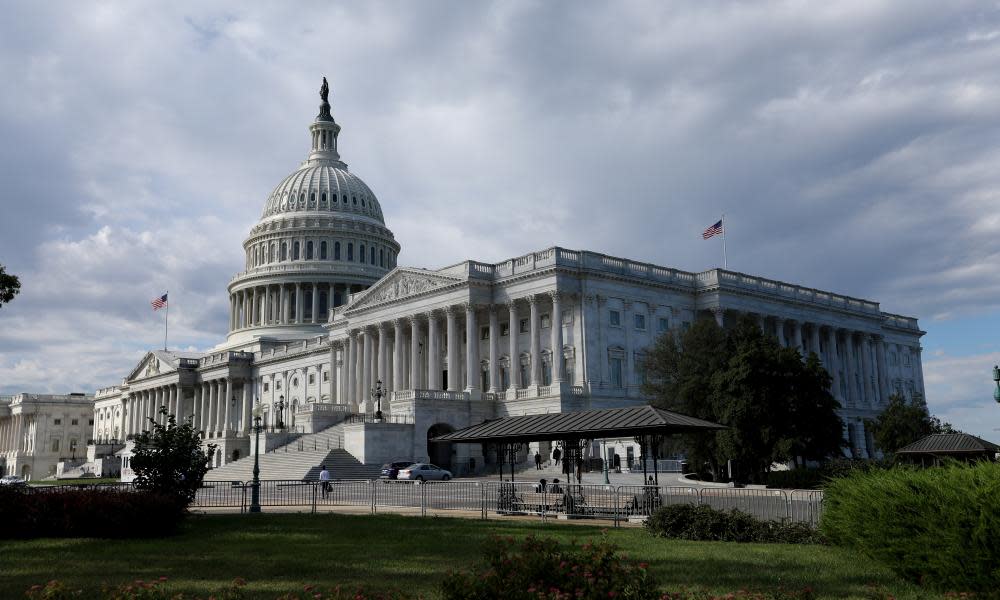US debt ceiling deal: what has to happen now to get it passed?

- Oops!Something went wrong.Please try again later.
- Oops!Something went wrong.Please try again later.
- Oops!Something went wrong.Please try again later.
The United States has days before it runs out of time to pay its bills and avoid a first-ever national default. Washington lawmakers are scrambling to push through a deal that would temporarily suspend the US debt limit, averting a potential disaster for the domestic and global economy.
The debt ceiling, which caps the amount of debt the US can hold, currently sits at $31.4tn. The US hit that limit in January. Since then, the treasury has taken “extraordinary measures” to prevent default.
Last week, the treasury secretary, Janet Yellen, warned lawmakers that the US must pay its debts by 5 June – at which point the government would default.
The deal on the table
Over the weekend, negotiators for Joe Biden and the House speaker, Kevin McCarthy, reached a tentative deal to suspend the debt limit and avoid a debt default.
The clock then began for members of the House, who had 72 hours to review the deal and pass it through a floor vote.
Then there’s a vote
The powerful House rules committee meets to review the deal, called the Fiscal Responsibility Act of 2023, on Tuesday afternoon. The deal is expected to go to a chamber vote on Wednesday.
If passed by a simple majority in the House, the bill would then move to the Senate for another review, which could take days. The Senate majority leader, Chuck Schumer, told senators to be prepared to vote on Friday and potentially over the weekend, days before the 5 June deadline.
Once it moves through both chambers of Congress, the bill then goes to the president’s desk for his signature.
What are its chances of getting through?
While lawmakers have expressed confidence that the bill would successfully get past Congress, some hardline Republicans have signaled they will not sign the deal.
Representative Chip Roy of Texas, a member of the rules committee, has urged fellow lawmakers to vote no on the deal.
“This is not a deal that we should be taking,” Roy told Blaze Media’s Glenn Beck on Tuesday.
What’s in the deal?
If passed, the deal would suspend the US debt limit through 1 January 2025, well past the next US presidential election, which is in November 2024. But suspending the debt limit is a temporary measure, and the US would need to bring down the national debt or raise the ceiling by the new deadline.
Related: US debt ceiling deal: what’s in and out of Biden and McCarthy’s agreement
The deal would keep non-defense spending roughly the same for fiscal year 2024 and raise it by 1% in fiscal year 2025.
The bill would also place new restrictions on Snap benefits, limiting the number of individuals eligible for food stamps. Unspent emergency aid related to the Covid-19 pandemic, totaling about $30bn, will also be returned to the government.
What happens if the US credit score drops?
A national default would probably tank the US credit rating, currently at AAA, the highest status. A lower credit rating makes it more risky for international lenders and costly for individuals living in the US to take out loans.
The last time the US reached the brink of a national default was 2011. After that, one credit rating agency, S&P, downgraded the US’s credit rating, citing troubled policymaking in Washington. That sent markets tumbling, sending shockwaves through the global economy, and made it more expensive for ordinary consumers seeking to buy a house or a car.
What’s next?
Concessions had to be made on both sides of the aisle. Biden and McCarthy will need to assuage members of their party ahead of a major election year, in which both are seeking another term.
“We have learned from past debt limit impasses that waiting until the last minute to suspend or increase the debt limit can cause serious harm to business and consumer confidence, raise short-term borrowing costs for taxpayers, and negatively impact the credit rating of the United States,” Yellen wrote in a letter to McCarthy on Friday.
Failing to increase the debt limit “would cause severe hardship to American families, harm our global leadership position, and raise questions about our ability to defend our national security interests”, Yellen added.

